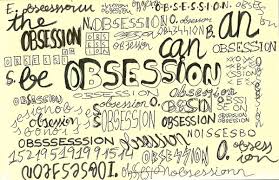
Obsession is a word used frequently in our society today. There seems to be a growing obsession with being obsessed, you might say. The Merriam-Webster online Dictionary defines the word as “a persistent disturbing preoccupation with an often unreasonable idea or feeling”. There are other definitions given as well but this is the first one listed. Words to note in that definition are “preoccupation” and “unreasonable”.
Do you know people who are obsessed with something? Could you be described as a person with an obsession? In our day, people get obsessed with Facebook, video games, sports, technology, and so on. While these seem like innocent obsessions, they can become harmful when they interrupt normal human interaction and preoccupy the person constantly. People also get obsessed about more disturbing things like drugs or pornography. These obsessions can rise to the level of addiction and they not only damage the person, these obsessions can have very negative social consequences.
Sometimes the Catholic Church is accused of having an obsession about abortion but I would disagree with that. Going back to the definition of obsession, I don’t think the way our Church treats abortion is a “disturbing preoccupation” nor is it “unreasonable”. If our Church were preoccupied with abortion you would be hearing about it CONSTANTLY. It would be the subject of nearly every homily, bulletin article and newsletter. But that simply is not true, is it? Most of us hear a homily on the topic of abortion once or twice per year. We may never hear one on artificial contraception, embryonic stem cell research or other issues related to the earliest stages of life.
In a recent interview with the Boston Globe, Cardinal Sean O’Malley had this to say:
“The normal Catholic in the parish might hear a sermon on abortion once a year. They’ll never hear a sermon on homosexuality or gay marriage. They’ll never hear a sermon about contraception. But if you look at the New York Times, in the course of a week, there will be 20 articles on those topics. So who is obsessed? Now, the Church’s positions are very clear and very consistent. For us, life is at the very center of our social teachings. Life is precious. It is a mystery. It must be nurtured, protected, the transmission of life is sacred. And our defense of human life is a great service to society. When the state begins to decide who is worthy of living and who isn’t, all human rights are put in jeopardy, but the voice of the church is very clear. And we’re not just saying that life is precious in the womb but life is precious when someone has Alzheimer’s when someone has AIDS when someone is poor when someone has mental illness. Their humanity is not diminished – and they have a claim on our love and on our services. So the church’s position is a very consistent one. It is a consistent life ethic. I don’t think that we are obsessed, however, when the New York Times is writing 20 articles a week about these things and make reference to the Church in half of those articles, it gives the impression. But I think in the parishes, these things are talks, in a routine way, in CCD classes, along with the rest of the Catholic doctrine but all of our teachings fit together. They’re part of a whole. There’s a consistency in our life ethic.”
I don’t know about you, but I like that statement. It very clearly states that, as Catholics, we are respecters of life at absolutely every stage, that we honor and protect human life as sacred - no matter what.
I am writing this article on Wednesday, January 22nd, the 41st Anniversary of the legalization of abortion in the United States. Yes, our Church still prays, marches, and stands against that decision. We hope beyond all hope that the hearts of the people in our country can be changed so that life can be seen as the gift it truly is. We love every person regardless of their “stage” of life or state in life be it in the womb, in the prison, in the nursing home, the intensive care unit or in a hospice facility. We serve people in need with food, health care, clothing, shelter, counseling and a plethora of other services designed to enhance their human dignity. These are the things that make me proud to be Catholic.
If that means I am obsessed then so be it!
